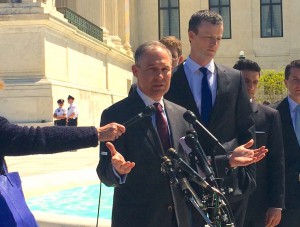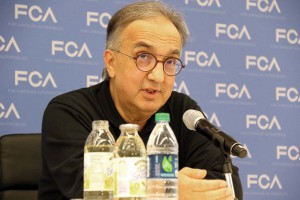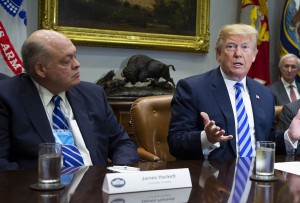
EPA Administrator Scott Pruitt's proposals to rollback CAFE as well as other options were submitted to the OMB.
The moment so many waited for or dreaded finally arrived: the Department of Transportation submitted its proposals on Corporate Average Fuel Economy, or CAFE, standards.
The proposals, created with the assistance of the National Highway Traffic Safety Administration, were handed over to the Office of Management and Budget, the final step before being submitted to the White House for a decision.
The current CAFE standards, which were set by the Obama administration, call for automakers to average 54.5 mpg by 2025. In real world driving conditions, that equates to about 36 mpg. However, since the new administration took office, it has been widely expected that those numbers will drop.
EPA administrator Scott Pruitt suggested earlier that rollback in the Obama fuel-economy standards, was likely as the current standards were “too high.” President Donald Trump lowering the standard place on Detroit automakers and would “get Motor City revving its engines again.”
(Fiat Chrysler backs off proposed CAFE rollbacks. Click Here for the story.)

FCA CEO Sergio Marchionne amended his position on the rollback of CAFE standards after meeting with President Trump.
A draft of the Trump administration changes made public earlier this spring would lower the requirements for automakers, according to the Associated Press, keeping them at a minimum mileage of roughly 30 miles per gallon in real-world driving from 2020 through at least 2025.
The EPA submitted a proposal following that metric today as well as others that featured lower mileage mandates as well as the current rule calling for the 54.5 mpg average. In short, Pruitt has left it up to President Trump to pick the plan he favors.
If the mileage mandate is lowered, a slew of lawsuits are likely, starting with the State of California, which has already said it would do so. The Golden State would probably be joined in that suit by nearly a dozen others who follow the California mandate — California has a waiver that allows the state to set its own mileage requirement to help it fight air pollution. Those states account for 40% of U.S. new car sales annually.
(Click Here to see more about the auto industry backing away from CAFE cuts.)
One of the proposals submitted includes a provision revoking California’s right to set its own standard, which has always perplexed automakers afraid of a two-mileage requirement system.

Ford CEO Jim Hackett looks on as President Donald Trump makes a point during a meeting with automakers.
Pruitt said in April, according to the AP, that regulators would establish a standard that “allows auto manufacturers to make cars that people both want and can afford — while still expanding environmental and safety benefits of newer cars.”
Critics of change suggest that process is already in place with the current standards. “It seems that the Trump administration is dead-set on undoing vehicle standards, one of the most important—and successful—policies we have to cut oil use and global warming pollution,” said Michelle Robinson, Director of the Clean Vehicles Program at the Union of Concerned Scientists, earlier this year.
(Trump meets with automakers about CAFE, blasts NAFTA instead. Click Here for the story.)
“It’s an indefensible and frankly embarrassing decision.We have years’ worth of research by federal and state agencies showing that these standards are both technically feasible and cost-effective. We’ve seen automakers putting out cleaner models every year as they’re enjoying some of the best sales years in history.”
